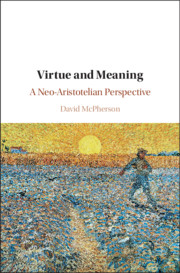7 results
Chapter 2 - Virtue, Happiness, and Meaning
-
- Book:
- Virtue and Meaning
- Published online:
- 09 January 2020
- Print publication:
- 30 January 2020, pp 44-75
-
- Chapter
- Export citation
Introduction: Toward Re-Enchantment
-
- Book:
- Virtue and Meaning
- Published online:
- 09 January 2020
- Print publication:
- 30 January 2020, pp 1-7
-
- Chapter
- Export citation
Chapter 5 - Homo Religiosus
-
- Book:
- Virtue and Meaning
- Published online:
- 09 January 2020
- Print publication:
- 30 January 2020, pp 150-193
-
- Chapter
- Export citation
Chapter 1 - The Human Form of Life
-
- Book:
- Virtue and Meaning
- Published online:
- 09 January 2020
- Print publication:
- 30 January 2020, pp 8-43
-
- Chapter
- Export citation
Chapter 4 - Cosmic Outlooks
-
- Book:
- Virtue and Meaning
- Published online:
- 09 January 2020
- Print publication:
- 30 January 2020, pp 115-149
-
- Chapter
- Export citation
Chapter 3 - Other-Regarding Concern
-
- Book:
- Virtue and Meaning
- Published online:
- 09 January 2020
- Print publication:
- 30 January 2020, pp 76-114
-
- Chapter
- Export citation

Virtue and Meaning
- A Neo-Aristotelian Perspective
-
- Published online:
- 09 January 2020
- Print publication:
- 30 January 2020

